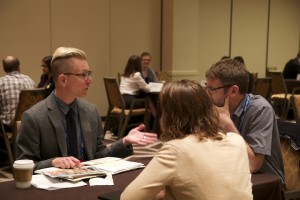Do you hire public historians?
17 July 2015 – Daniel Vivian

Participants at the “speed networking” session at the 2016 National Council on Public History Annual Meeting. Photo credit: National Council on Public History
Do you have a role in hiring public historians? Do you review applications and weigh in on hiring decisions? Or do you make those decisions yourself? If the answer to any of these questions is yes, we need you to take the public history employer survey. The joint task force on public history employment and education has developed the survey as part of its efforts to understand the current state of the public history job market. Although job opportunities have improved from their low point in 2008-2010, questions remain about the overall health of the field. To better understand employers’ expectations and needs, the task force seeks information about what employers look for in hiring historians at all levels. The results will be used to identify emerging areas of activity, align training with employers’ expectations, and provide professional organizations with information needed for advocacy, constituent support, and formulating policy.
The survey is available here. Anyone involved in hiring public historians is eligible to take it. Respondents do not have to be responsible for final hiring decisions, only involved in evaluating applicants. Public history, for our purposes, encompasses the traditional fields of archives, museums, historical interpretation, historic preservation, and historical consulting as well as emerging areas of expertise, such as digital media. If you think of some possible people as public historians, whether or not they self-identify as such, they probably are.
The joint task force on public history education and employment is a collaborative effort of the National Council on Public History (NCPH), the American Association for State and Local History, the American Historical Association, and the Organization of American Historians. Inspired largely by the questions raised in former NCPH President Robert Weyeneth’s essay “A Perfect Storm,” the task force seeks answers to some of the most pressing questions facing the field today. Are there too many public history graduate programs? Are job opportunities decreasing? Where is the field headed? While the task force may not be able to provide conclusive answers, we can gather the information needed to make informed judgments. As Weyeneth noted, a sense that fundamental changes are underway has been a staple of conversations among public historians in recent years, but general impressions and anecdotes are of limited value. To better understand how the field is changing and why, we need data. In an immediate sense, this is what the task force aims to do.
If you are involved in hiring public historians, we urge you to take the survey at your earliest convenience. Please also share it with friends and colleagues. The survey is a step toward understanding the current state and direction of public history. We all need it to succeed–and will benefit from the information it yields. Survey results will be shared as soon as they are available.
— Daniel Vivian and Philip Scarpino
Daniel Vivian is assistant professor of history and director of public history at the University of Louisville in Louisville, Kentucky. Philip Scarpino is professor of history and director of the graduate program in public history at Indiana University-Purdue University Indianapolis in Indianapolis, Indiana. They co-chair the joint task force on public history education and employment.




Interested in work in the public history field in new Jersey or Savanah Ga